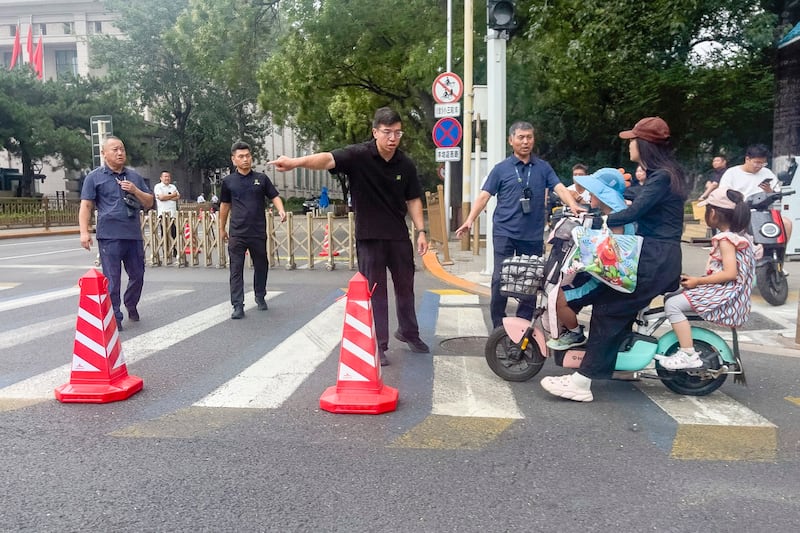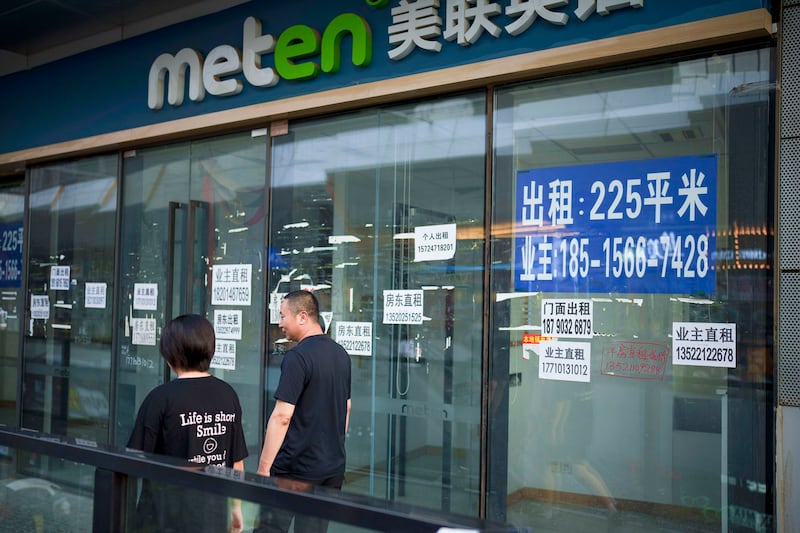Chinese officials have been visiting foreign-invested companies in a bid to understand their “current problem and difficulties” amid plummeting foreign direct investment in the country, according to official documents.
Foreign investment officials from the State Council’s National Development and Reform Commission visited Shanghai and the northern province of Shaanxi from July 9-12, according to an official announcement from the foreign investment department dated July 16.
The move comes as the ruling Chinese Communist Party holds its secretive third plenary session at a Beijing hotel amid promises of "reforms" that will kickstart the country's flagging economy amid an ongoing exodus of foreign capital.
China posted a lower-than-expected GDP growth rate of 4.7% year-on-year in the second quarter of this year, missing an expected growth rate of 5.1%, China’s National Bureau of Statistics said on Monday.

Foreign direct investment in China fell by nearly 29.1% in the first half of this year to 498.91 billion yuan (US$68.7 billion), compared with the first half of 2023, according to figures from the Ministry of Commerce.
The officials “visited and investigated foreign-invested enterprises and conducted one-to-one exchanges and discussions, actively promoting our country’s foreign investment policies,” the announcement said.
Officials were also able to “gain a deep understanding of the current problems and difficulties faced by foreign-invested enterprises ... actively respond to their key concerns, and further boost the confidence of foreign-invested enterprises,” it said.
‘Just putting on a show’
Zhang Shengli, a former analyst at a Shanghai securities company who worked for Midea before the pandemic, said he doesn’t expect the current leadership under Xi Jinping to come up with measures to address the exodus of foreign investors, however.
“This third plenum of the Central Committee is just putting on a show for the people,” Zhang said. “They say stuff that sounds good, but will it really be implemented?”

He said the key to boosting China’s economy lies in improving relations with the rest of the world, citing the reform and opening up policies of late supreme leader Deng Xiaoping in the late 1970s.
“How did reform and opening up come about in 1979? It was about giving foreign investors [preferential] treatment, so they were willing to come in,” he said. “Foreign investors aren’t going to be fooled by insignificant concessionary policies now.”
He said the current leadership is far more interested in enriching itself than in improving the lives of the majority.
“You expect these powerful people to go against their own interests and give preferential treatment to foreign companies and ordinary people?” Zhang said. “The Communist Party wants to be a dictatorship ... so it can plunder the entire country.”
A lawyer based in the southern province of Guangdong who gave only the pseudonym Li Ming for fear of reprisals said state media articles lauding Xi Jinping as a “reformer” in the mold of Deng Xiaoping are just sloganeering.
“We have a saying about two layers that means that what these slogans say are totally disconnected from what the government actually does,” Li told RFA Mandarin. “That includes attracting foreign investment.”

He cited the disconnect between China's claims to be opening up the service sector on the one hand and the national obsession with espionage and "national security."
“China has an anti-espionage law that runs entirely counter to its claim to open up the service sector to attract foreign investment,” Li said.
‘A huge chasm’
China's Ministry for State Security in January arrested the head of a foreign consultancy as an alleged British spy, with one newspaper warning that there are " 007s" everywhere in real life.
Huang's is the latest in a string of arrests of foreign nationals and raids on foreign consultancies that come in the wake of amendments to China's Counterespionage Law in 2023, which has been criticized by investors for its vague definition of what exactly constitutes espionage.
The visits to foreign-invested companies came as the State Council announced it would temporarily open up healthcare and travel services in several major cities to foreign-invested companies, who will be allowed to run non-profit medical and elderly care facilities and travel agencies in six cities including Shenyang, Wuhan, Guangzhou and Chengdu.
Foreign equity ratio restrictions on value-added telecom services like app stores and internet service providers have also been removed in Shenyang, Nanjing, Hangzhou, Guangzhou and Chengdu, according to an official announcement.
Financial journalist Wang Jian said the move, the first loosening of foreign investment curbs in three years, amounted to “plenty of thunder but no rain.”
“It’s related to the sharp drop in foreign investment in China, and shows how serious the overall economic situation has become,” Wang told RFA Mandarin in a July 16 interview.
“The measures ... are scattered, the areas that apply are narrow, and they're really only suitable for small and medium-sized enterprises,” he said. “It’s aimed at sending out a positive signal ahead of the third plenum, but it won't have much effect.”
“Without substantive political reform, there can be no real opening up of the economy,” Wang said.

A resident of the southwestern city of Chongqing who gave only the nickname Mag for fear of reprisals said many ordinary people in China are only too aware of the disconnect between official slogans and official action.
“It feels like there’s a huge chasm between our government and leaders and ordinary people,” Mag said. “They live our lives and we live ours.”
“Everyone knows they’re better at talk than action,” he said. “If you want money, you have to fight for it yourself.”
“It doesn’t matter how many policies they bring in – they’re never going to actually benefit people like us,” Mag said.
Translated by Luisetta Mudie.
